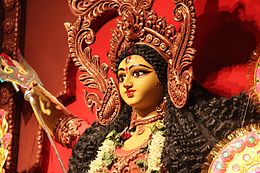Durga Puja, also called Durgotsava, is an annual Hindu festival in the Indian subcontinent that reveres the goddess Durga. It is particularly popular in West Bengal, Bihar, Jharkhand, Odisha, Assam, Tripura, Bangladesh and the diaspora from this region, and also in Nepal where it is called Dashain.
Durga Puja in details
The Durga Puja rituals in Hindu mythology have been classified into two the External and the Internal forms. Let us take a look into these forms of various rituals performed in the Hindu mythology. Performing Puja or worshipping the God is directly related to purifying the soul and making it free from various types of evils that keeps us surrounded with and thus making our minds contaminated.
DURGA PUJA RITUALS
1. Bodhan
As per the mention in the Bengali Calendar, during the month of Ashwin, Goddess Durga’s Bodhan occurs. Bodhan refers to awakening and as per the Puranas, Ram had first performed this ritual to cause to defeat Ravana. This event is referred to as Akalbodhanand the Durga is referred to as Sharadiya. With our prayers and puja we are entitled to awaken the supder powers of the almighty Gods and Goddesses and thus to save to save the human masses from getting affected with thje existence of evil powers.
2. Ghatsthapan
To get the most benefits, this ritual is considered to be very important! In this ritual, a copper or Brass vessel is made filled with water and is set in front of the idol of the Goddess Dura or an earthen base. Right over the vessel, 5, 7 or 9 leaves of mango tree along with a clean piece of cloth and a coconut is placed over the vessel. This is a way of purifying the ambience of the place where it is the vessel is put in.
3. PranPrathustha
Basically the idol that we worship and that is placed over various Pandals are made from either clay or wood or any other lifeless material and they do not have life in it in actual sense. So, in order that, we could be able to put in the soul of the divine Durga, various Mantras and Slokas are uttered. This fills in the idol with the life of the idol of the Goddess. It’s only our belief that keeps us motivated towards the pure way of life and makes us strong like the sword of Maa Durga.
4. NavaPatraika
This one is a ritual that is observed on the morning of Saptami! From different trees, 9 lives are collected and are called as NavaPatrika and they all symbolise the 9 forms of Maa Durga and are worshipped from Saptami. In colloquial language the NavaPatrika is referred to as KalaBou. This one is mace of nine distinct saplings and is bind together with the creeper of Shet Aparajita, Alta (liquid of red colour used for the decoration of feet) and red string. Finally, a cover of white Sari with red border is placed over this and is made seated near the idol of Goddess Durga. Here also, each of the saplings is symbolic of the nine forms of Maa Durga.
Kalo Kochu – Devi Kalika
Haridra – Devi Durga
Ramva – Devi Bromhanee
Jayanti – Devi Kartikee
Billo – Devi Shiva
Dhanno – Devi Laxmi
Ashok – Devi Shokrohita
Darrim – Devi Raktodontika
Maan Kochu – Devi Chaamunda
Sandhi Puja
Sandhi Puja is done during the last 24 minutes of Ashtami and first 24 minutes of Navami and in this time Maa Durga is worshipped in the form of Devi Chamunda. It has been observed by many learned people that this one is the highest form of the worship of Devi Durga. 108 lamps are lit during this ritual and 108 lotus are dedicated for the worshipping the Goddess.
Sacrifice
During older times, it was a ritual to sacrifice animals in order to complete the Puja but these days it is considered unethical to take the life of living being for the making completion of any type of Puja.
Yagna
This one is one an integral part of the Durga Puja! This is done top show the devotion and dedication of the worshipper towards Maa Durga. The process of performing the Yagna is a long process.
The primary goddess revered during Durga Puja is Durga, but her stage and celebrations feature other major deities of Hinduism such as goddess Lakshmi (goddess of wealth, prosperity), Saraswati (goddess of knowledge and music), Ganesha (god of good beginnings) and Kartikeya (god of war). The latter two are considered to be children of Durga (Parvati).[22] The Hindu god Shiva, as Durga’s husband, is also revered during this festival. The festival begins on the first day with Mahalaya, marking Durga’s advent in her battle against evil. Starting with the sixth day (Sasthi),
Durga Puja Dates
Kalash Sthapana 10th October 2018 Wednesday
Maha Panchami 14th Sunday 2018 Sunday
Maha shasthi 15th October 2018 Monday
Maha Saptami 16th October 2018 Tuesday
Maha Ashtami 17th October 2018 Wednesday
Maha Navami 18th October 2018 Thursday
Dussehra 19th October 2018 Friday.

